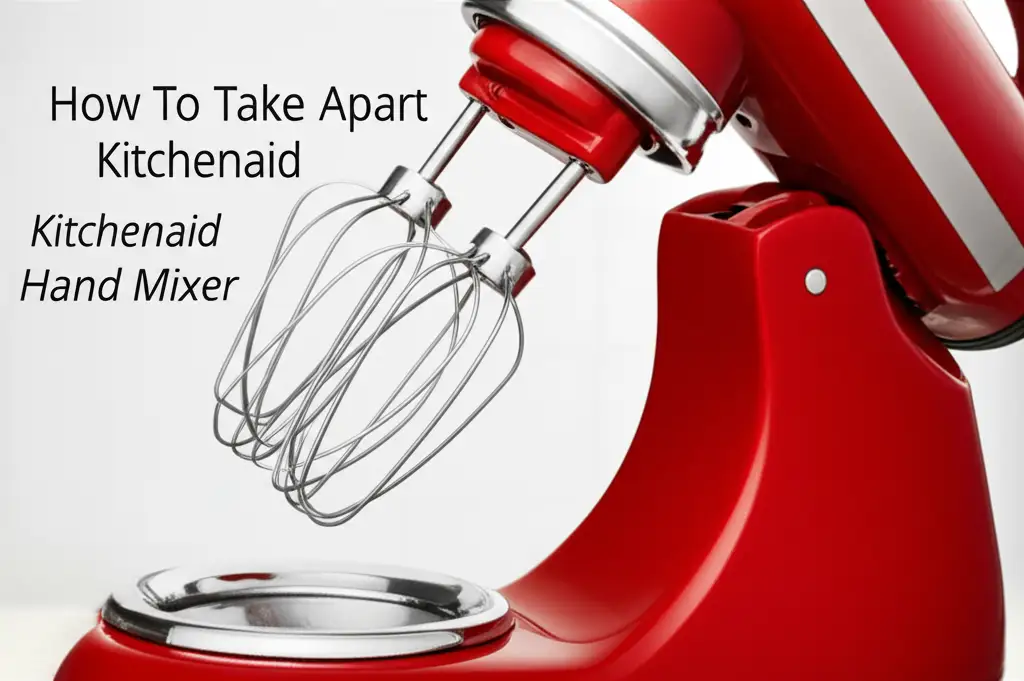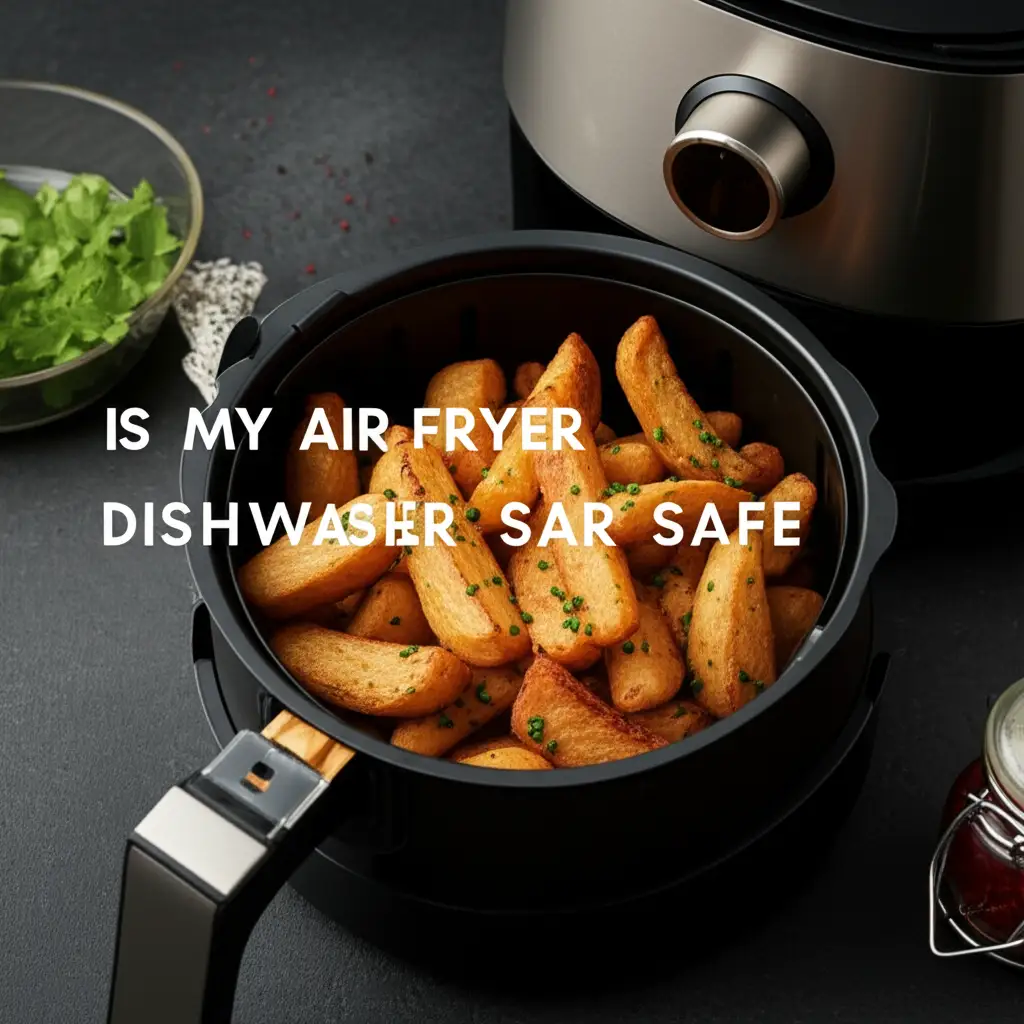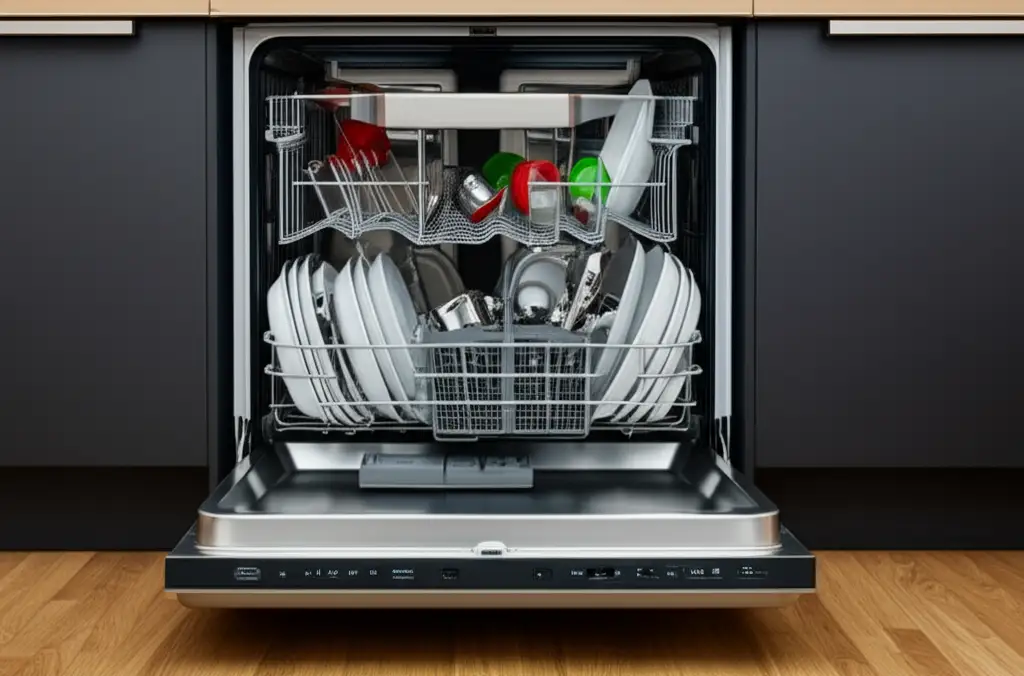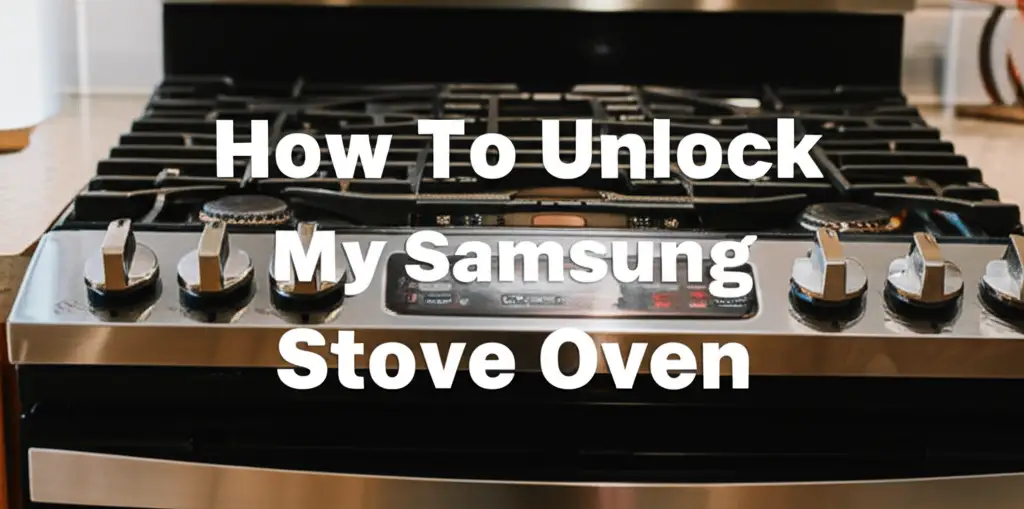· Elira Thomsen · Kitchen Appliances · 16 min read
Is It Ok To Put Knives In The Dishwasher
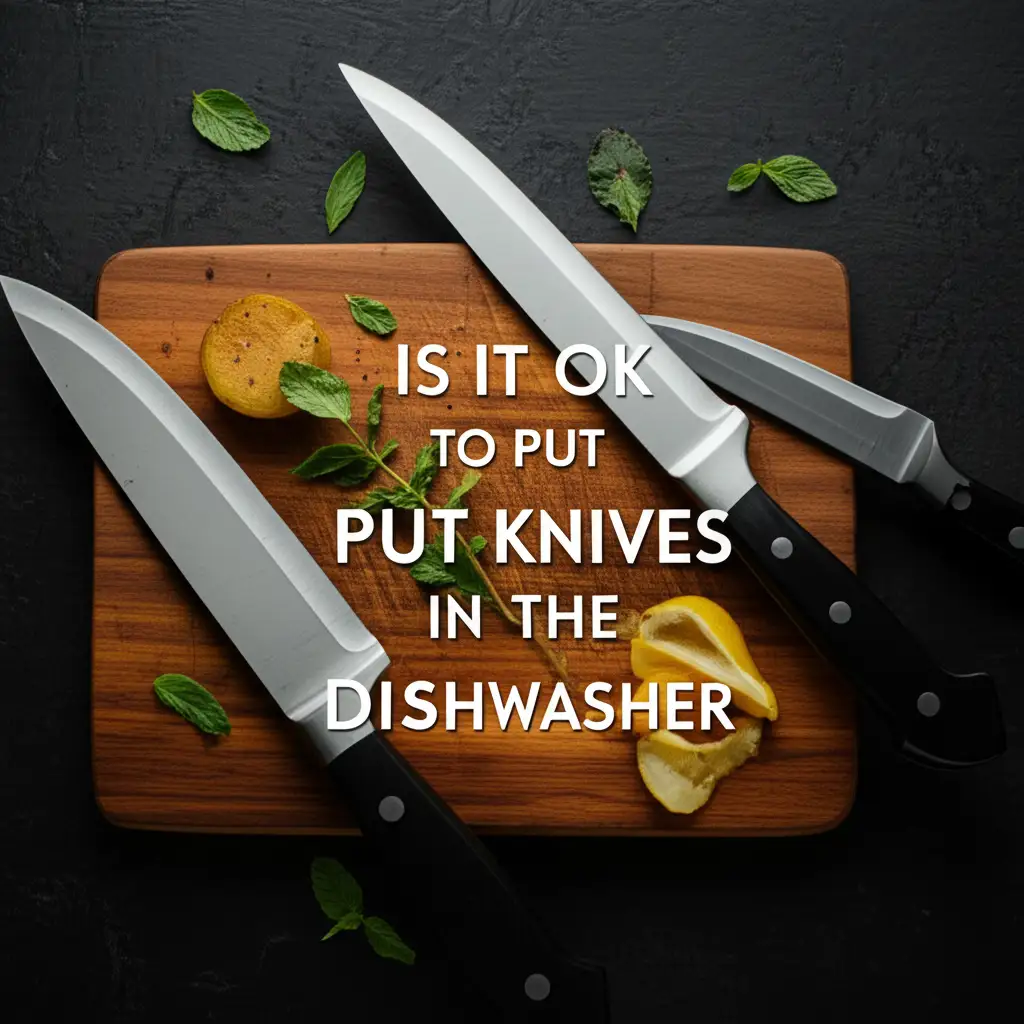
Is It OK to Put Knives in the Dishwasher?
Have you ever wondered if tossing your kitchen knives into the dishwasher is a good idea? Many of us look for easy ways to clean up after cooking. The dishwasher seems like a perfect solution for dirty dishes. However, when it comes to sharp kitchen tools, the answer to “Is it OK to put knives in the dishwasher?” is not as simple as it seems.
This common question sparks a big debate among home cooks and professional chefs. While the dishwasher offers convenience, it can cause significant damage to your valuable knives. This article explores why dishwashers are not ideal for knives. We will look at how they affect blades and handles. We will also cover safety concerns and proper knife care methods. By the end, you will understand the best ways to keep your knives sharp and safe.
Takeaway
- Most kitchen knives should not go into the dishwasher.
- Dishwashers damage knife blades, making them dull and causing rust.
- The high heat and harsh detergents degrade knife handles, especially wood.
- Placing knives in the dishwasher creates a serious safety hazard.
- Hand-washing knives is the best way to maintain their sharpness and extend their life.
Can You Put Knives in the Dishwasher?
Generally, no, it is not okay to put knives in the dishwasher. The harsh detergents, high heat, and abrasive environment can dull blades, corrode metal, warp handles, and pose a safety risk during loading and unloading. Hand-washing extends knife life and maintains sharpness.
Understanding Dishwasher Effects on Knife Blades
Many people believe that modern dishwashers are safe for all kitchen items. This is often not true for knives. The inside of a dishwasher is a harsh place for a delicate blade. Understanding these effects helps you make better choices for your knife collection. Let us look closer at how dishwashers harm knife blades.
The Impact of High Heat
Dishwashers use very high temperatures during their wash and dry cycles. This heat can be damaging to knife blades. Intense heat causes the metal to expand and contract. Over time, this process can weaken the blade’s structure. This leads to reduced edge retention. It means your knife will lose its sharpness faster.
The heat can also affect the temper of the steel. Knife blades are heat-treated to make them strong and durable. High dishwasher temperatures can reverse this treatment. This makes the blade softer and more prone to bending or chipping. You will find your knife performs poorly and needs sharpening more often. It is important to avoid extreme temperature changes for good knife care.
How Harsh Detergents Affect Blades
Dishwasher detergents are very strong. They contain abrasive chemicals designed to strip away tough food residue. These chemicals are too harsh for knife blades. They can erode the polished surface of the blade. This leads to a dull, faded appearance over time.
Beyond appearance, these detergents can cause chemical reactions with the metal. This is especially true for high-carbon steel knives. The chemicals break down the protective layer on the steel. This makes the blade vulnerable to corrosion. Rust spots can appear quickly. Even stainless steel, while more resistant, can show signs of damage. For more on how these detergents work and their impact, read about Can You Use Dishwasher Liquid in Dishwasher. Using the wrong detergent or too much of it can have severe consequences for your knives. Remember, precision tools need gentle care.
Blade Dullness and Chipping Risks
Putting knives in the dishwasher almost guarantees a dull blade. During the wash cycle, knives can bang against other dishes, silverware, or the dishwasher racks themselves. This repeated impact creates tiny nicks and dents along the cutting edge. These small damages accumulate, making the blade dull over time.
Additionally, the powerful water jets in the dishwasher can push knives around. This movement increases the chances of blades striking hard surfaces. A direct hit can cause a significant chip in the blade. Such damage often requires professional sharpening to repair. It is better to protect your blades by keeping them out of this rough environment. Hand-washing prevents these impacts and maintains edge integrity.
Protecting Knife Handles from Dishwasher Damage
Knives are not just about their blades; the handles are equally important. They provide grip and balance, making the knife safe and comfortable to use. Dishwashers pose a significant threat to the integrity and appearance of knife handles. Different materials react differently to the harsh conditions inside the machine.
Wood and Composite Handle Degradation
Many high-quality knives feature handles made from natural materials like wood. Wood is very susceptible to moisture and extreme temperatures. Inside a dishwasher, wood handles soak up water and then dry rapidly under high heat. This constant cycle causes the wood to swell, crack, and warp. Over time, the handle can become loose or even separate from the blade.
Composite handles, made from materials like resin or synthetic polymers, are also at risk. While more durable than natural wood, they can still degrade. High heat can cause these materials to become brittle or discolored. They might lose their original finish and feel. The dishwasher environment significantly shortens the lifespan of these handle types.
Rivet and Fastener Integrity
Many knife handles are attached to the blade using rivets or other fasteners. These components are usually made of metal. The intense heat and harsh chemicals in dishwasher detergents can corrode these fasteners. Rust can form around the rivets, weakening their grip. This makes the handle loose and unsafe.
Loose handles are a major safety concern. A wobbly handle can make the knife difficult to control. This increases the risk of accidental cuts. Over time, the rivets might completely fail, causing the handle to detach. This renders the knife unusable and potentially dangerous. Proper hand-washing protects these crucial connection points.
Safety Concerns When Washing Knives in the Dishwasher
Beyond damage to the knives themselves, putting sharp objects in the dishwasher creates significant safety hazards. Your personal safety and the safety of others in your household are paramount. These risks are often overlooked in the quest for convenience.
Risk of Injury During Loading and Unloading
Loading knives into the dishwasher is risky. Sharp blades can easily slip from your grasp. They can cut your hand as you try to place them in the utensil basket. The confined space of the dishwasher also makes it hard to handle long, sharp knives safely. You might accidentally brush against another sharp object or the rack itself.
Unloading is even more dangerous. Your hands reach into a crowded basket of clean items. A sharp knife blade, now hidden among forks and spoons, can cause a serious cut. These cuts are often deep and require medical attention. It is very easy to forget where you placed a knife amidst other items. This risk applies to everyone who unloads the dishwasher, including children. Prioritizing safety means keeping sharp objects out of this shared appliance.
Knife Movement During Wash Cycles
During a dishwasher cycle, powerful water jets spray and circulate water. These jets can cause knives to move around inside the machine. A knife might shift from its intended position in the utensil basket. It could then fall through the rack. If a knife falls, its sharp blade can point upwards. This creates a dangerous spike within the dishwasher.
This movement also risks damage to the dishwasher itself. A loose knife can hit the spray arms, cutting or bending them. It can also scratch the interior walls or the door gasket. Such damage can lead to costly repairs. Furthermore, a moving knife could potentially damage other dishes in the load. It can chip or scratch glassware and plates. Keeping knives out of the dishwasher protects both you and your appliance.
Specific Knife Types and Dishwasher Compatibility
Not all knives are created equal, and their construction materials dictate how they should be cleaned. While the general rule is to hand-wash, some specific types of knives might seem like exceptions. It is important to understand the differences before making a choice.
High-Carbon Steel vs. Stainless Steel Knives
High-carbon steel knives are prized for their exceptional sharpness and edge retention. However, they are highly reactive to moisture and harsh chemicals. Putting them in the dishwasher will almost certainly lead to rust and discoloration. The high heat can also damage their fine edge. These knives require immediate hand-washing and thorough drying after each use.
Stainless steel knives are more rust-resistant due to their chromium content. This leads some to believe they are dishwasher safe. While they might not rust as quickly as high-carbon steel, they are still vulnerable. Dishwasher detergents can cause pitting and dullness. They can also develop “flash rust” if exposed to certain minerals in water or if left wet for too long. Even stainless steel benefits greatly from hand washing.
Ceramic and Specialty Knives
Ceramic knives are known for their extreme sharpness and ability to hold an edge for a long time. However, ceramic is a brittle material. It is prone to chipping or breaking upon impact. The jostling and banging inside a dishwasher can easily damage a ceramic blade. Even a slight knock against another dish can cause a chip.
Specialty knives include items like serrated bread knives, carving knives, or utility knives with unique designs. Serrated blades, in particular, are difficult for dishwashers to clean effectively. Food particles can get stuck in the serrations. The dishwasher’s jets might not dislodge them. Also, the repetitive impact can dull the individual teeth of the serrations. For items like these, hand-washing ensures proper cleaning and prevents damage. If you’re wondering about other items, check out Can I Put Nutribullet in Dishwasher for similar discussions on dishwasher safety.
The Best Way to Clean Your Knives: Hand Washing Techniques
Since dishwashers are not ideal for knives, hand washing becomes the preferred method. This approach ensures your knives remain sharp, pristine, and safe for years. It is a simple process that offers many benefits. I find that taking a few moments to properly hand wash my knives truly extends their life and keeps them performing at their best.
Step-by-Step Hand Washing
Cleaning a knife by hand is quick and easy. First, rinse the blade under warm running water immediately after use. This prevents food from drying onto the blade. Next, use a soft sponge or a dishcloth with mild dish soap. Gently wipe the blade from the spine (the dull top edge) down to the cutting edge. Always wipe away from your hand, never towards it. Take care around the sharp edge.
Wash the handle thoroughly, ensuring all food residues are removed. Avoid using abrasive scrubbers or steel wool, as they can scratch the blade or handle. Focus on a gentle, but effective clean. This method protects the blade’s sharpness and the handle’s finish. It gives you full control over the cleaning process.
Proper Drying and Storage
Drying your knives immediately after washing is critical. Do not let them air dry or sit wet in a dish rack. Water, especially if it contains minerals, can cause rust spots on the blade. Even stainless steel can develop “flash rust” if left damp. Use a clean, dry towel to thoroughly dry both the blade and the handle. Ensure no moisture remains on the knife.
Once dry, store your knives properly. Do not toss them into a cluttered drawer where they can bump against other utensils. This dulls the blade and poses a safety risk. Use a knife block, a magnetic strip, or an in-drawer knife organizer. Proper storage protects the blade’s edge and keeps your kitchen safe. Investing in good storage is as important as good cleaning practices.
Extending the Life of Your Kitchen Knives
Taking care of your kitchen knives goes beyond just cleaning. Proper maintenance significantly extends their lifespan and keeps them performing like new. Think of your knives as precision tools that require regular attention.
Regular Maintenance and Sharpening
A sharp knife is a safe knife. A dull blade requires more force to cut. This increases the risk of slipping and causing injury. Regular sharpening maintains the blade’s edge. You can use a honing steel frequently between sharpening sessions. A honing steel realigns the blade’s edge. It does not remove metal, but keeps the blade straight.
For true sharpness, knives need occasional sharpening with a whetstone or a knife sharpener. How often depends on how much you use them. A well-maintained knife cuts efficiently and safely. It makes food preparation a joy instead of a chore. I always feel more confident in the kitchen when my knives are properly sharpened.
Understanding Detergent Impact
The type and amount of detergent you use for cleaning dishes matters, even if you are hand-washing knives. Some dish soaps are gentler than others. Harsh, abrasive detergents can still leave residues that might affect the blade over time. When hand-washing, choose a mild dish soap. This protects the knife’s finish and material.
If you consider using specialized cleaning agents for your dishwasher, be aware of their chemical composition. Even if not directly washing knives, strong chemicals can linger. They might interact with your hands when you later handle knives. Understanding how much dishwasher powder to use is also key to avoiding excessive chemical exposure for your other dishes. Too much detergent can leave a residue on everything. It is always better to err on the side of caution with powerful cleaning agents. You can even use vinegar for some cleaning tasks, but be careful where to put vinegar in dishwasher to clean if you choose that method.
Dispelling Common Myths About Dishwashing Knives
Misinformation often circulates about kitchen practices. When it comes to knives and dishwashers, several myths persist. It is important to separate fact from fiction to ensure the longevity and safety of your valuable kitchen tools. Let’s look at some of these common misunderstandings.
”Top Rack Is Always Safe”
A popular myth suggests that placing knives on the top rack of the dishwasher makes them safe. The idea is that the top rack is farther from the heating element and less exposed to direct spray. While the heat might be slightly less intense, the top rack is not a safe zone for knives.
The water jets still reach the top rack with significant force. Knives can still move around, clanging against other items. This causes dullness and chips. Moreover, the detergents are still present throughout the entire wash cycle. These chemicals will still react with the blade and handle materials. The top rack offers no real protection against the fundamental reasons knives should not go into a dishwasher. It remains a high-risk area for delicate blades.
”Stainless Steel is Indestructible”
Many people believe that because a knife is labeled “stainless steel,” it is immune to dishwasher damage. The term “stainless” refers to a resistance to rust, not an absolute immunity. Stainless steel alloys contain chromium, which forms a protective layer against corrosion. However, this layer can be compromised.
Harsh dishwasher detergents, especially those with high concentrations of chlorine or phosphates, can break down this protective layer. This leads to “pitting” or small, localized corrosion spots. If the knife is left in a humid environment or with food particles for too long after the wash, it can also develop “flash rust.” This appears as small, reddish-brown spots. The high heat can also discolor stainless steel over time. While more durable than high-carbon steel, stainless steel knives are certainly not indestructible in a dishwasher. They still benefit from the gentle care of hand washing.
FAQ Section
Can I put my cheap knives in the dishwasher?
Even cheap knives are not suitable for dishwashers. While they might be less of a financial loss if damaged, the dishwasher can still dull their edges, cause handles to degrade, and pose a safety risk. The heat and harsh detergents will quickly ruin their cutting ability and appearance. Hand-washing is always best for any knife.
Will putting knives in the dishwasher dull them?
Yes, putting knives in the dishwasher will dull them. The vigorous spray, high heat, and contact with other dishes cause tiny nicks and abrasions on the blade’s edge. This constant friction and impact gradually wear down the sharp edge, making the knife less effective and requiring more frequent sharpening.
What causes rust on knives in the dishwasher?
Rust on knives in the dishwasher is mainly caused by a combination of harsh detergents, high heat, and prolonged exposure to moisture. The chemicals in detergents can strip away protective layers on the steel. High temperatures accelerate oxidation. Leaving knives wet for too long after the cycle also promotes rust formation, especially on high-carbon steel.
How should I store knives after washing?
After hand-washing and thoroughly drying your knives, store them safely to protect their blades and your hands. Options include a magnetic knife strip mounted on the wall, a knife block on the counter, or an in-drawer knife organizer. These methods keep blades sharp and prevent accidents.
Is there any knife that is truly dishwasher safe?
Few, if any, knives are truly “dishwasher safe” without some compromise. Some inexpensive knives with molded plastic handles and simple stamped stainless steel blades might survive a few cycles. However, even these will experience dulling and potential handle degradation over time. High-quality knives should never go into the dishwasher.
How often should I sharpen my knives?
How often you sharpen your knives depends on usage. For most home cooks, sharpening every few months is a good guideline. Use a honing steel before each use to realign the blade’s edge. If your knife feels dull or struggles to cut, it is time for a proper sharpening session.
Conclusion
The question, “Is it OK to put knives in the dishwasher?” often arises from a desire for convenience. However, the answer is consistently no for almost all types of kitchen knives. We have explored the many reasons why this is the case. Dishwashers harm knife blades by causing dullness, rust, and chipping. They also damage knife handles, leading to warping and loose parts. Moreover, placing sharp knives in the dishwasher creates significant safety risks for anyone loading or unloading the machine.
Protecting your investment in quality kitchen tools means opting for the hand-washing method. This simple practice ensures your knives remain sharp, their handles stay intact, and your kitchen remains a safer place. It takes only a few moments to properly wash and dry a knife by hand. This small effort pays off by extending the life and performance of your blades for many years to come. Choose hand-washing to keep your knives in top condition.


